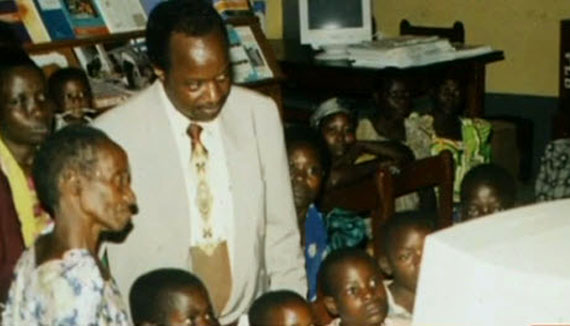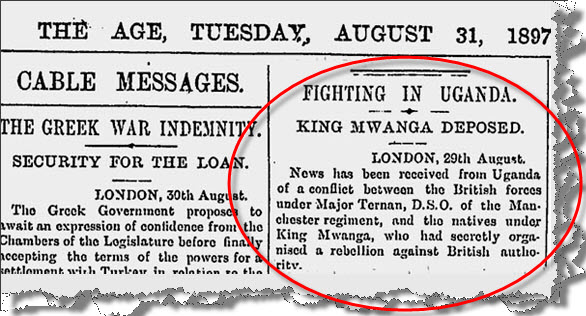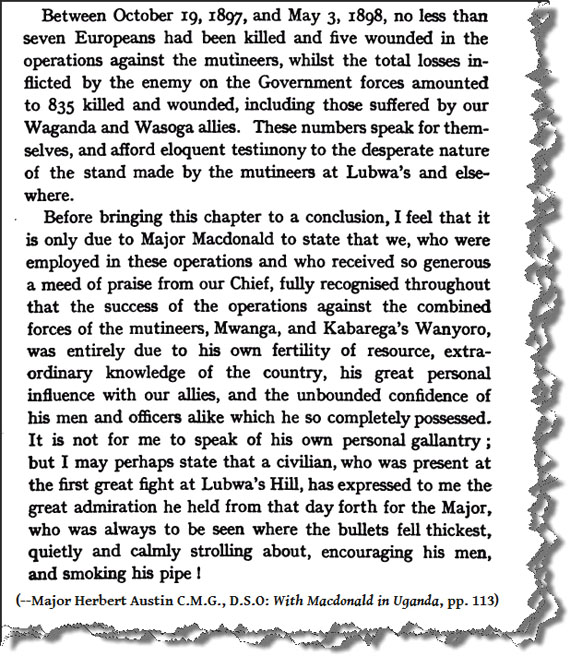
[HOME ] [ABOUT] [PHOTOS] [VIDEO] [BLOG] [HOUSTON] [TEXAS] [U.S. NEWS] [WORLD NEWS] [SPORTS] [POP CULTURE] [CONTACT]
Part I: Dr Aggrey Kiyingi and Uganda's Museveni lock horns

Dr. Aggrey Kiyingi in the early 2000s as he introduces computers and the Internet to schools in Uganda. Screenshot from Australia's Weekend Sunrise television show.
by Joseph Earnest May 11, 2015
Newscast Media HOUSTON, Texas—His is a life that reads like a plot from a James Bond movie. His arch rival, with 30 years under his belt as the sole contender in the landlocked East African country, realizes this is no ordinary foe challenging him for the presidency. (A free PDF file with all five parts can be found at the end of the series).
At the funeral of his late wife Robinah, the Australian-based Ugandan cardiologist, Dr. Aggrey Kiyingi narrates that he was approached by a state agent, who was armed with a pistol, and ordered him to enter a car that was parked within the vicinity.
"No, I will not," an angry Kiyingi cried out, after noticing the car into which the agent wanted to thrust him, was an unmarked vehicle.
This is a story of a doctor who has dared to challenge the power structure in Ugandan politics...A story of a man, who believes his bid for the presidency is not just a duty, it is a calling. A man, who has cheated death three times, but embarks on the undertaking to conquer his Goliath—Uganda's Museveni.
Yet above all, both Museveni and Kiyingi are fully aware, that there can only be one resident at Uganda's State House.
While most people his age would be reflecting about what type of legacies they will leave behind, Uganda's Yoweri Museveni shows no signs that he intends to peacefully relinquish power to the next generation.
In the 2003 Hollywood blockbuster movie Gladiator starring Russell Crowe who played the part of Maximus, the Emperor Marcus Aurelius seeks to choose a successor to replace him and rule the vast Roman Empire. His son Commodus is not a moral man, yet his daughter Lucilla has the qualities that make an excellent Emperor.
"If only you had been born a man," the Emperor tells his daughter, "what a Caeser you would have made!" Marcus Aurelius is more concerned about his successor being just, so he says, "You would have been strong. I wonder, would you have been just?" To which the clever Lucilla replies, "I would have been what you taught me to be."
Because Rome is plagued with corruption, Marcus Aurelius wants someone outside Roman political circles. Someone who isn't tainted with the evil politics of Rome, and the only person capable of moving Rome forward, is one of Rome's greatest generals— Maximus.
Aurelius sends for Maximus to convince him to become Rome's next Emperor. Yet Maximus wants to leave Rome and go back to his family and live as a farmer.
"What is Rome, Maximus?" Marcus Aurelius asks him. "Rome is the light," replies Maximus.
"Yet you have never been there. You have not seen what it has become. When a man sees his end, he wants to know there was some purpose to his life," the Emperor responds.
"How will the world speak my name in years to come? Will I be known as the philosopher? The warrior? The tyrant? Or will I be the Emperor, who gave Rome back to herself?"
The questions the Emperor poses signify his interest in the kind of legacy he will leave behind. He then tells Maximus, who is hesitant about becoming Emperor, "I want you to become the protector of Rome, after I die. I will empower you to one end alone, to give power back to the people of Rome, and end the corruption that has crippled it...you have not been corrupted by the politics."
Dr. Aggrey Kiyingi believes since he hasn't been corrupted by Uganda's politics, he is the right man to usher in true fundamental change, yet his announcement of his intention to run for president has created him his greatest enemy—Yoweri Museveni.
When Kiyingi made his announcement, immediately the government of Uganda slapped charges against him. He's been branded a terrorist. He has also been accused of killing Muslim clerics in Uganda and attacking police stations. Kiyingi vehemently denies the charges and asserts that Museveni is back to his old tricks of bullying opponents in an effort to dissuade them from running against him.
In an interview on Australia's Weekend Sunrise show, the host asks Kiyingi why he would challenge the presidency especially when Kiyingi has a good life in Australia.
"That's exactly the reason," Dr. Aggrey Kiyingi replies, "it is the good life I have had here in Australia, and Australia has made me what I am. Very comfortable, peaceful, and well off. Now, when you look at the pictures coming out of Uganda, and I have people on the ground...when they send you...somebody's been shot in the head, and brains, literally, flying out on the road, because he was protecting his little kiosk from being trampled and taken away, by Museveni's men—when you see a two-year-old girl, being shot in the stomach, allegedly for demonstrating...this was a two-year-old girl, no guns, and the parents weren't demonstrating—when you look at the hospitals and you see toilets...well, I don't know...they are not toilets, even a pig's den is better than that, and I'm comfortable...even now I am early here (on the show) but I had breakfast.
"Do I sleep comfortably, with a clean conscience?...Especially when the people of Uganda have time and time again asked me to go back, and do something about that."
Kiyingi then explains the type of philanthropic work he has done in his home country Uganda in the past few decades: "...Because, in years past, I did a lot of things in Uganda, and this was in a private capacity. I was here (in Australia), but I committed almost half of my salary and income to helping Uganda, and other parts of Africa, but particularly Uganda, I helped schools, I literally single-handedly helped introduce Internet to schools, in Uganda, in the early 2000s. I supported many students, and children. I supported women's groups, I built wells and clean living...and the people said if you could do that by yourself, you could do more as a politician."
Asked about the current claims that he is a murderer and killer of Muslims, Kiyingi answers, "The current ones? The current ones are because, the man (Museveni) is in a panic. Although he is a general, he is actually a coward. I say coward because I regard bullies as cowards. Even in schools, those are the greatest cowards—if you're a bully. And Museveni is a bully. He terrorizes people. There is a state of perpetual fear in Uganda. He has calculated this over the years, because his armoury and ruthless men are terrible. They will hit you on the head with a club and shoot you. If you are a businessman and known, they will collapse your business. He's got lots and lots of ways of collapsing you..." The interview can be seen below. Watch:
Dr. Aggrey Kiyingi is a Sydney doctor running for President of Uganda. He joins the
Weekend Sunrise show in Australia to explain why.
In fact, when asked by Jason Om, in a Lateline interview that was aired by Australian Broadcasting Corporation on April 21, 2015, Dr. Kiyingi pinned the deaths of the Muslim clerics on Museveni himself. Kiyingi said the charges against him are a political setup to stop him from challenging the president.
"Did you have any role in the killing of seven people?" Jason Om asked.
"I've never supported terrorism in any way. I've never funded any terrorist group or any terrorist,"
Kiyingi replied. "Absolute nonsense. Of course I didn't. Now Mr. Museveni, we
know and the Ugandans know that he's responsible for this. He is an
adept of killings and framing people," Kiyingi
told Lateline ABC in this video.
(pop-up)
"[President Museveni] knows very well if there is a free and fair election in Uganda, I'd beat him hands down," he said.Yahoo
news: Museveni behind killings of Muslims
Kiyingi then turns the tables on Museveni, and spells out how he (Museveni) has violated the very Constitution he authored, which permits the people to effect a change in leadership, if violated by the president.
"Under the Constitution of Uganda which Museveni authored," Kiyingi told his hosts on Voice of Uganda Radio which airs from New York city, "it empowers the people of Uganda, to effect a change, in government, if the president abrogates, or compromises or breaks the Constitution, and there are avenues for this. The first avenue is to have the parliament impeach the president, but as you know, this is a rubber-stamped parliament, it's not going to impeach the president.
"However, there is a second avenue after that. The people themselves can then change the government. Therefore we have a mandate now.
"If this man blocks me from going to Uganda...if this man continues to harass my supporters...if this man refuses to change the electoral commission...if this man refuses to put a level playing field for a true and honest election, then the people of Uganda are empowered by the Constitution, to effect a change."
After refusing to enter the unmarked car at his wife's funeral in 2005, Kiyingi told the London Evening Post, that a high-ranking official in the military happened to be around. The military official offered Kiyingi his bodyguards to ensure his safety. Kiyingi then said, Museveni intended to have him killed on the way to the Criminal Investigation Division (CID) headquarters and claim that Kiyingi was shot in the back of his head because he tried to escape from the vehicle. Of course Kiyingi cheated death the first time, and arrived alive, which he claims stunned officers at the CID headquarters.
It appears, the way things are unfolding, Museveni, by his actions or inaction, could be unknowingly creating a recipe for a mutiny within the military, since there are some of his generals who are protecting Kiyingi and disagree with their boss.
The issue of mutinies in this East African nation are not uncommon. When Idi Amin rose to power, it happened as a result of a mutiny. We can even go farther back before colonialism and examine the Madist mutiny. The Sudanese who were under the direct command of Selim Bey revolted against their foreign handlers. Because they were stationed in the region of Madi in West Nile, it was referred to as the Madist revolt. The Sudanese who are Luo, had been treated as disposable objects and fighting mercenaries by the British. They lived like dogs and were treated as such.
The Sudanese were inspired by Buganda kingdom's Kabaka Mwanga who had rebelled against British authority. Mwanga convinced the rival king of Bunyoro called Kabalega to join him in ousting the British, and was also successful in convincing the Sudanese to revolt against their British masters. Under Kabaka Mwanga's command, who was the father of guerilla warfare in Africa, he led the mutineers (Sudanese) and the Banyoro, together with his Baganda fighting force against the British East Africa Company.
Mwanga put up a fight in which the British were inflicted several blows including the death of their top commanders, that they had to import Indian slaves from India to join forces with the British to fight Mwanga. Unfortunately for Mwanga, as he was embarking on a major assault against the British in Lango, a boy from Bukedi snitched on the Kabaka, revealing the king's hiding place, and both kings, Mwanga and Kabalega, were captured by Anderea Luwandagga and Semei Kakungulu respectively.
The news made headlines and was published in The Age newspaper in London on August 31, 1897 as shown below that reads:
FIGHTING IN UGANDA—KING MWANGA DEPOSED
"...News has been received from Uganda of a conflict between the British forces under Major Ternan, D.S.O. of the Manchester regiment, and natives under King Mwanga, who had secretly organised a rebellion against British authority..."

The report was confirmed by Major Herbert Austin, a decorated soldier, who wrote in his diary that more than seven Europeans had been killed by Mwanga and an additional 835 of the Government forces (Indian mercenaries) including some Waganda and Wasoga.
Major Austin also writes: "...I feel that it is only due to Major Macdonald to state that we, who were employed in these operations and who received so generous a meed of praise from our Chief, fully recognised throughout the success of the operations against the combined forces of the mutineers, Mwanga, and Kabarega's Wanyoro, was entirely due to his own fertility of resource..."

Above is an extract from Major Herbert Austin's diary. The queen of England, Queen Victoria, required every soldier to make entries into a journal that were published by the Royal Geographic Society.
When a mutiny happens, it is because there is dissatisfaction within the military and conflict between the soldiers and the commanding officers. This triggers a disruption within the chain of command, as some soldiers take sides with the ordinary people, while others continue to serve the commanding officer(s), even though they may disagree with him or her.
In this case above, we can see that Mwanga secretly engineered the mutiny and was able to convince a faction of the Sudanese garrison to follow him, in addition to convincing a rival king to direct his ammunition and anger against the British rather than the Baganda people. All the actors involved in the mutiny revolted for the common good of the people of Buganda, Bunyoro and West Nile in Northern Uganda.
Kiyingi's story dove-tails into the above because we have seen that a high-ranking officer disagreed with "orders from above" and instead of leaving Kiyingi's life exposed to danger, the officer provided his personal bodyguards to protect Kiyingi.
Kiyingi then revealed to the Weekly Observer, the London Evening Post and Voice of Uganda Radio, that while in jail, in the exercise yard where prisoners do their workouts, a prison guard who had intel that Kiyingi's food had been poisoned, whispered in Kiyingi's ear, "When you arrive at the court building tomorrow, you will be offered food from within the courthouse. Reject the food, for it has been poisoned to ensure you don't walk out of the courthouse alive."
We can see a pattern beginning to form here. In the military, Kiyingi's life is protected from harm. In the prison system too, the guards must have received a tip from the outside about the use of poison to eliminate Kiyingi. Let's now take a look at the third sector, which is the judicial system and law enforcement, and how it rescued Kiyingi.
Kiyingi was facing what he calls "trumped up charges" in 2005 from the government that he killed his late wife Robinah. Kiyingi denied the charges and said it was actually the government responsible for her death, because she had written an incriminating report for Transparency International exposing the level of corruption and theft that has permeated Uganda. Suspicious that his wife might have revealed her findings to Kiyingi, and that the philanthropic work he was doing was setting the stage to challenge Museveni's presidency, Kiyingi believes he became a target for elimination.
Many things did not add up in the case against Kiyingi which was eventually thrown out. First, while Kiyingi was in jail, prosecution witness Private John Atwine, who according to court records confessed to Nasuna Sadha that he is the one who pulled the trigger, died while in state custody. Many suspect he was poisoned. This was based on the defense witness Dr. Andama Joseph's testimony, who testified that he treated Atwine, and the patient complained of being tortured and stomach aches, then abruptly died.
Because most of the government's witnesses were relying on statements made by John Atwine, and because this key witness died under suspicious circumstances while in state custody, the judge said if the state had tied the death of Atwine to Kiyingi, its case would've had some traction. However, the state itself was to blame for the death of its key witness as shown in the following opinion: "...One of such evidence could have been if the state had tied the death of Atwine on the accused persons. But here the state was more to blame than the accused because it was its duty to keep Atwine safe in custody."
Something analysts also said, is that the prosecution should have looked into the non-profit company Transparency International which had compiled a corruption report against Museveni's government. The state failed to interview the late Robinah Kiyingi's colleagues at work, which was a fatal error, as the prosecution had weak evidence linking Kiyingi to the murder.
In one instance, in an effort to convince the presiding judge of Kiyingi's guilt, the state said that evidence that Kiyingi committed the crime was because he did not cry while giving a speech during the church service of the funeral.
The judge shot back by saying, "People express grief in many ways. In fact there is no standard form of grief unless it is being orchestrated. Some cry others don’t. Some break down in grief while others standup to the grief. Therefore to attach the guilt of the accused to the type of speech he made at the funeral service clearly lacked moral certainly. That chain of evidence should accordingly be discounted for being weak and uncertain because it did not rule out the human weakness of the accused: See Bogere Charles -Vs-Uganda, Supreme Court criminal Appeal No 10 of 1998."
In the end, the Honorable Judge Rubby Aweri Opio looked at the case against Kiyingi and threw it out because he found that the state failed to prove its case, and opined:
"...Although it was not his duty to prove his innocence, Dr Kiyingi made a formidable defence, which created a huge cloud of doubt on the prosecution case. He destroyed the allegation that during the eve of the murder he had sneaked into the country to bring in money to pay the killers.
"His explanation was that he had come to do his private business and to perform a social function. He had been invited as a guest of honour in a social function during the launching of Nagujja’s album where his company was the sponsor. I have no reason to disbelieve that explanation. If the accused had come to finance the said deal, at least some part of the money could have been recovered from one of the accused person because the deal was said to have involved a lot of money. However not even 100,000/ was recovered from the late Atwine or Charles Berwanaho, who was said to be the one who was charged with the distribution of the said funds...For the above reasons and others already outlined, I find this case has not been proved beyond reasonable doubt and I therefore would not feel comfortable to convict the accused...the law is very straight on that point, suspicion however high it may be, can never be a basis for conviction.
"Therefore having failed to prove this case to the required standard and this being a very serious crime, I would feel very uncomfortable in convicting the accused. In agreement with both assessors, I find Dr Kiyingi not guilty on the charge. He is accordingly acquitted." (Uganda Prosecutor v. Dr. Aggrey Kiyingi and two others, Criminal Session Case No. 0030 Of 2006, December 10, 2006 verdict).
After the above verdict was rendered, Kiyingi walked out of court a free man, so he thought.
"When I went back to my home in Buziga, assassins were sent with big guns to kill me," Kiyingi said in a radio interview. "However, we put up a fight against the assassins and they fled, after realizing I and my team of bodyguards were much more powerful than they were."
Kiyingi goes as far to say that he even filed a report at the Kabalagala police station, but interestingly enough, the entire incident was swept under the rug.
Having cheated death the third time by escaping the assassins sent to kill him, Kiyingi then experiences another miracle where after the Australian government secured travel documents for him in a neighboring country to use, a flight attendant smuggled him onto a plane at the heavily-guarded Entebbe airport. Kiyingi has since forgiven his children for testifying against him when they were 10 years younger than they are today. Earlier this year, Kiyingi would announce his intention to run for president of Uganda, an ambition that has rubbed the sitting president Yoweri Museveni the wrong way.
We have seen how even state operatives go against the grain and side with a man considered to be an enemy of the state. It should worry Museveni that there is a syndicate within his own party, that is tired of serving him after 30 years, and instead has aligned itself with the citizenry.
Furthermore, Kiyingi revealed to Voice of Uganda Radio that Museveni has already rigged the 2016 election in his favor, and he explains how Museveni did it, even before the election has happened. Find out in Part II how according to Kiyingi, the 2016 election has been rigged and the Uganda Constitution been violated>>
Add Comments>>
Related stories:
Part I: Dr Aggrey Kiyingi and Uganda's Museveni lock horns
Part II: Kiyingi-How Museveni compromised 2016 election
Part III: Dr. Kiyingi's version of Museveni's 118 assassins
Part IV: Dr. Kiyingi-I want to give Uganda back to her people
Part V: The new Uganda within a decade of Museveni's exit
|
|
Join the Newscast Media social networks
for current events and multimedia content.
Copyright© Newscast Media. All Rights Reserved. Terms and Privacy Policy
